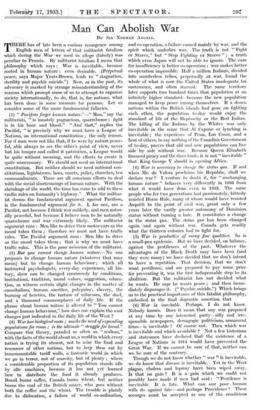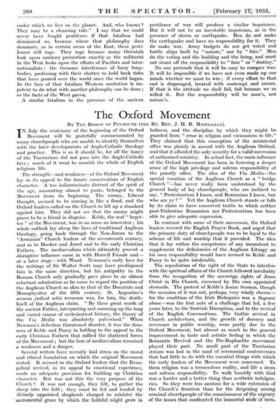Man Can Abolish War
• BY SIR NORMAN ANGELL.
THERE has of late been a curious resurgence among English men of letters of that militarist fatalism which during the War we used to allege- (falsely) was peculiar to Prussia. By militarist fatalism I mean that philosophy which says : War is inevitable, because rooted in human nature ; even desirable. (Perpetual peace, says Major Yeats-Brown, leads to "stagnation, sterility and psychic suidide.") Now, as in the past, its advocacy is marked by strange misunderstanding of the reasons which prompt some of us to attempt to organize society internationally, .to do, that is, for nations, what has been done in some measure for persons. Let us consider some of the more fundamental fallacies.
(1) " Pacifists forget human .nature."—" Man," say the militarists, "is innately pugnacious, quarrelsome ; fight is in Isis bone and blood." "And that,", replies the Pacifist, "is precisely why we must have a League of Nations, an international constitution ; the only reason. For if man were not like that, if he were by nature peace- ful, able always to see the other's point of view, never lost his temper and called it patriotism, a League would. be quite without meaning, and the efforts to create it quite unnecessary. We should not need an international constitution. But neither should we need national con- stitutions, legislatures, laws, courts, pollee, churches, ten commandments. These are all conscious efforts to deal with the social shortcomings of human nature. With the shrinkage of the world, the time has come to add to these traffic rules on humanity's highway." What the militar- ist deems the fundamental argument against Pacifism, is the fundamental argument for it. I, for one, am Pacifist, not because I think war unlikely, and men natur- ally peaceful, but because I believe men to be naturally quarrelsome and war extremely likely. The militarist argument runs : Men like to drive their motor-cars as the mood takes them ; therefore we must not have traffic rules. The Pacifist argument runs : Men like to drive as the mood takes them ; that is why we must have traffic rules. This is the pens asinorum of the militarist.
(2) But you cannot change human nature.—No one proposes to change human nature (whatever that may mean) but, to change human behaviour ; which all instructed psychologists, every-day experience, all his- tory, show can be changed enormously by conditions, institutiens, tradition, moral values, suggestion, educa- tion, as witness certain slight changes in the niatter of cannibalism, human sacrifice, polygamy, slavery, the burning of heretics, the torture of witnesses, the duel, and a thousand, commonplaces of daily life. If the phrase about human nature is altered to "You cannot change human behaviour," how does one explain the vast changes just indicated in the daily life of the West ?
(8) War has biological roots ; marks the need of expanding populations for room ; is the ultimate " struggle for bread." Compare this theory, paraded so often as "realism," with the facts of the world about us, a world in which every nation is trying its utmost, not to seize the food and resources of other nations, but to keep them out by insurmountable tariff walls, a fantastic world in which we go in terror, not of scarcity, but of plenty ; where a considerable proportion of its population stands idle by idle . machines, because it has not. yet learned how to distribute the food it already produces. Brazil. burns. coffee, Canada burns wheat, but neither burns the coal of the British miner, who goes, Without both the coffee and the wheat. The trouble is plainly due to dislocation, a failure of world co-ordination,
and co-operation, a failure caused mainly by War, and the spirit which underlies war. The truth is not "Fight or Starve," but "Stop Fighting or Starve " ; a truth which even Japan will not be able to ignore. The cure for insufficiency is better co-operation; war makes better co-operation impossible. Half a million Indians, divided into numberless tribes, perpetually at war, found the whole of what is now the United States inadequate for sustenance, and often starved. The same territory later supports two hundred times that population at an infinitely higher standard—because the new population' managed to keep peace among themselves. If a dozen nations within the British islands had gone on fighting each other, the population to-day would enjoy the standard of life of the Heptarehy or the Red Indian. The killing of the Indians by the Whites was only inevitable in the sense that Al Capone or lynching is inevitable ; the experience of Penn, Las Casas, and a host of others, to say nothing of the Canadian Government of to-day, proves that old and new populations can live side by side without war. Because Queen Elizabeth financed piracy and the slave trade, it is not" inevitable" that King George V should in opening Africa.
(4) War is necessary to change the status quo. If and when Mr. de Valera proclaims his Republic, shall we declare war ? I venture to doubt it, for "unchanging human nature" behaves very differently in 1938 from what it would have done even in 1918. The same people who for two generations had passionately, bitterly resisted Home Rule, many of whom would have resisted Asquith to the point of civil war, grant only a few years later the vastly greater autonomy of Dominion status without turning a hair. It constitutes a change in the status quo. The status quo has been changed again and again without war. Canada gets readily what the thirteen colonies had to fight for.
(5) War is productive of many fine qualities. So is a small-pox epidemic. But we have decided, on balance, against the pestilences of the past. Whatever the advantages of the Black Death may have been (and they were many) we have decided that we don't intend to have a repetition. That decision, that we don't want pestilence, and are prepared to pay some price for preventing it, was the first indispensable step to its abolition. But the militarist has not decided what he wants. He says he wants peace ; and then imme- diately disparages it. (" Psychic suicide.") Which brings us to the practical importance of this fatalist philosophy, embodied in the final dogmatic assertion that (6) War is inevitable. Perhaps. I do not know. Nobody brows. Does it mean that any war proposed at any time by any interested party—silly and irre- sponsible newspapers, demagogic politicians, armament firms—is inevitable ? Of course not. Then which war is inevitable and which avoidable ? Not a few historians and statesmen have declared that the existence of a League of Nations in 1914 would have .prevented the Great _War. If we cannot be sure of that, neither can we be sure of the contrary.
Though we do not know whether " war " is inevitable, we do know that disease is inevitable. Yet in the West plague, cholera and leprosy have been wiped away. Is that no gain It is a gain which we could not possibly have made if men had. said : "Pestilence is inevitable. It is fate. What can, our poor human wills do against fate—and perhaps Providence ? These scourges must be accepted as one Of the conditions
' under which we live on the planet. And, who knows ? They may be a cleansing tide." I say that we "could never have fought pestilence if that fatalism had dominated us, - because where that philosophy does dominate, as in certain areas of the East, these pesti- lences still rage. They rage because many Orientals look upon sanitary precaution exactly as the militarist in the West looks upon the efforts of Pacifists and inter- nationalists : the tiresome interference of fussy busy- bodies, professing with their chatter to hold back tides that have poured over the world since the world began. In the face of that fatalism Western sanitation is im- potent to do what with another philosophy can be done ; as the facts of the West prove.
A similar fatalism in the presence of the ancient
pestilence of war will produce a similar impotence. But it will not be an inevitable impotence, is in the presence of -storm or earthquake. Men do not Make the earthquake and have no responsibility for it. They' do make war. Army budgets do not get 'voted and battle ships built by "nature," nor by "fate." Men do the voting and the building and the firing, and must not shunt off the responsibility to " fate " OT "destiny."
No one pretends that it will be easy to conquer war. It will be impossible if we have not- even made Up our minds whether we want to win ; if every- effort to that end is disparaged, treated with contempt and Sneers., If that is the attitude we shall fail, fail because we so willed it. But the • responsibility will be Man's, not nature's.







































 Previous page
Previous page